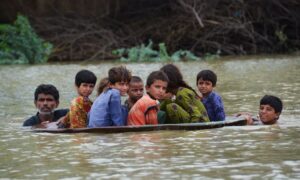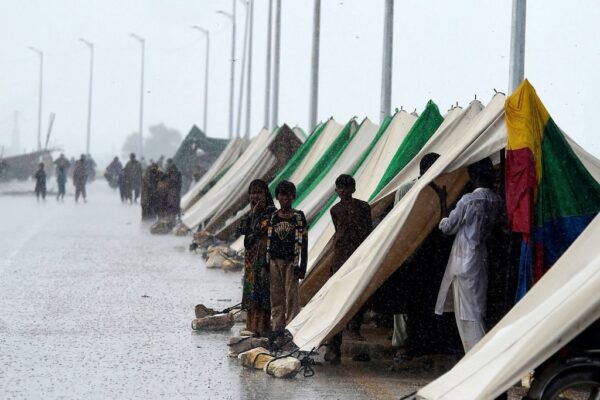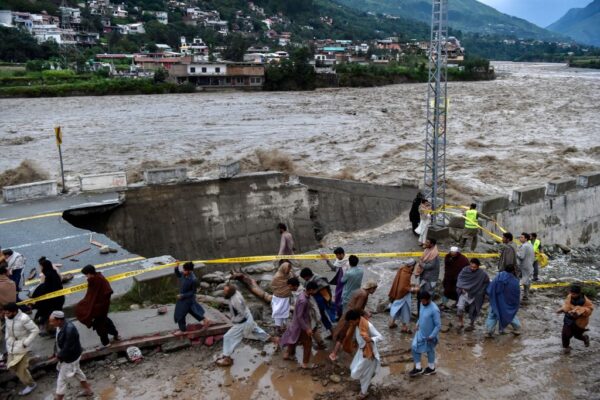Blaming Pakistan’s Flood Disaster on Human Driven Climate Change May Be Premature
CommentaryThe World Climate Declaration (WCD), signed by over 1100 reputable scientists, including Nobel Prize winners (pdf), states that there “is no statistical evidence that global warming is intensifying hurricanes, floods, droughts, and suchlike natural disasters, or making them more frequent.” It is useful to reflect upon this statement in the context of a discussion on the effects of climate change on the devastating floods that are devouring Pakistan. Global climate change is a shift in the long-term weather patterns that characterise the world’s regions. The term “weather” refers to the short-term (daily) changes in a region’s temperature, wind, and precipitation. As one of the most significant global challenges, climate change could adversely affect countries in several ways. In this context, a controversial report from the United Nations Intergovernmental Panel on Climate Change (IPCC) claims that global warming explains the increasing incidence of droughts and floods, causes health problems, and degrades agriculture (pdf). The report notes that climate change directly impacts food production because an increase in the average seasonal temperature can affect the production cycle of many crops and reduce yield. In other words, global warming will likely impact outcomes in areas where temperatures are already close to the physiological maxima for crops. Drivers of climate change, through alterations in the atmospheric composition, can also directly influence food production by impacting plant physiology, but the drivers are still not well represented by IPCC modelling. Pakistan Monsoon Flood Disaster The disastrous flooding in Pakistan’s Sindh, Khyber Pakhtunkhwa, and Baluchistan provinces has already claimed a huge death toll. Dozens of mountain tributaries feed the mighty Indus River that flows through Pakistan’s second-most populous region to the north, and many have burst their banks following record-breaking rains and melted glaciers. The country’s National Disaster Management Authority has indicated that the death toll from the monsoon rains has already claimed 1,033 lives, more than 1,500 people have been injured, over 700,000 livestock have been lost, and almost half a million people are now living in relief camps. People who fled their flood-hit homes stand outside temporary tents set along a road during a heavy monsoon rainfall in Sukkur of Sindh province, Pakistan, on Aug. 27, 2022. (Asif Hassan/AFP via Getty Images) People gather in front of a road damaged by flood waters following heavy monsoon rains in the Madian area in Pakistan’s northern Swat Valley on Aug. 27, 2022. (Abdul Majeed/AFP via Getty Images) Millions of Pakistani citizens have been displaced because the flood destroyed their villages. The agriculture and tourism sectors are the industries most affected by the flooding, which imposes additional burdens on the government. The authority predicts that it will take many years to rehabilitate the affected regions of Pakistan. The officials blame the devastation on human-driven climate change, claiming that Pakistan is unfairly bearing the consequences of irresponsible environmental practices elsewhere in the world. But affected communities criticise the government and local authorities for allowing builders to construct hotels on river banks. The government has declared an emergency and mobilised the military to deal with what Climate Change Minister Sherry Rehman has called “a catastrophe of epic scale.” In parts of Sindh, the only dry areas are the elevated roads and railroad tracks, alongside which tens of thousands of poor rural people have taken shelter with their livestock. Yet, this is not unprecedented within living memory: the Bangladesh cyclone in 1970 claimed 500,000 lives. This round of flooding could not come at a worse time for Pakistan. The economy is in free fall, and the former prime minister, Imran Khan, was ousted from power by a parliamentary vote of no confidence on April 10. According to data released by the State Bank of Pakistan, in August, the foreign currency reserves decreased to US$7.80 billion (pdf), the lowest level since 2019, due to increased debt payments and a lack of external financing. With resources depleting fast, the International Monetary Fund has recently designed a rescue package for Pakistan. Clean Energy Transition Needs Realistic Planning As recognised in the WCD, decarbonisation of a carbon-rich planet is unrealistic, as are the targets—zero emissions by 2050—stipulated by the Paris Agreement and the COP26 Glasgow Conference. Relevantly, the WCD states that “there is ample evidence that CO2 mitigation measures are as damaging as they are costly” and that “There is no climate emergency.” Proposed technologies for mitigating human recycling of life-supporting CO2, such as “carbon-capture-and-storage” (CCS), have proved to be costly diversions. Instead, people should be diverting rivers to mitigate flooding, stor

Commentary
The World Climate Declaration (WCD), signed by over 1100 reputable scientists, including Nobel Prize winners (pdf), states that there “is no statistical evidence that global warming is intensifying hurricanes, floods, droughts, and suchlike natural disasters, or making them more frequent.”
It is useful to reflect upon this statement in the context of a discussion on the effects of climate change on the devastating floods that are devouring Pakistan.
Global climate change is a shift in the long-term weather patterns that characterise the world’s regions. The term “weather” refers to the short-term (daily) changes in a region’s temperature, wind, and precipitation. As one of the most significant global challenges, climate change could adversely affect countries in several ways.
In this context, a controversial report from the United Nations Intergovernmental Panel on Climate Change (IPCC) claims that global warming explains the increasing incidence of droughts and floods, causes health problems, and degrades agriculture (pdf).
The report notes that climate change directly impacts food production because an increase in the average seasonal temperature can affect the production cycle of many crops and reduce yield. In other words, global warming will likely impact outcomes in areas where temperatures are already close to the physiological maxima for crops.
Drivers of climate change, through alterations in the atmospheric composition, can also directly influence food production by impacting plant physiology, but the drivers are still not well represented by IPCC modelling.
Pakistan Monsoon Flood Disaster
The disastrous flooding in Pakistan’s Sindh, Khyber Pakhtunkhwa, and Baluchistan provinces has already claimed a huge death toll. Dozens of mountain tributaries feed the mighty Indus River that flows through Pakistan’s second-most populous region to the north, and many have burst their banks following record-breaking rains and melted glaciers.
The country’s National Disaster Management Authority has indicated that the death toll from the monsoon rains has already claimed 1,033 lives, more than 1,500 people have been injured, over 700,000 livestock have been lost, and almost half a million people are now living in relief camps.


Millions of Pakistani citizens have been displaced because the flood destroyed their villages. The agriculture and tourism sectors are the industries most affected by the flooding, which imposes additional burdens on the government. The authority predicts that it will take many years to rehabilitate the affected regions of Pakistan.
The officials blame the devastation on human-driven climate change, claiming that Pakistan is unfairly bearing the consequences of irresponsible environmental practices elsewhere in the world. But affected communities criticise the government and local authorities for allowing builders to construct hotels on river banks.
The government has declared an emergency and mobilised the military to deal with what Climate Change Minister Sherry Rehman has called “a catastrophe of epic scale.”
In parts of Sindh, the only dry areas are the elevated roads and railroad tracks, alongside which tens of thousands of poor rural people have taken shelter with their livestock. Yet, this is not unprecedented within living memory: the Bangladesh cyclone in 1970 claimed 500,000 lives.
This round of flooding could not come at a worse time for Pakistan. The economy is in free fall, and the former prime minister, Imran Khan, was ousted from power by a parliamentary vote of no confidence on April 10.
According to data released by the State Bank of Pakistan, in August, the foreign currency reserves decreased to US$7.80 billion (pdf), the lowest level since 2019, due to increased debt payments and a lack of external financing. With resources depleting fast, the International Monetary Fund has recently designed a rescue package for Pakistan.
Clean Energy Transition Needs Realistic Planning
As recognised in the WCD, decarbonisation of a carbon-rich planet is unrealistic, as are the targets—zero emissions by 2050—stipulated by the Paris Agreement and the COP26 Glasgow Conference.
Relevantly, the WCD states that “there is ample evidence that CO2 mitigation measures are as damaging as they are costly” and that “There is no climate emergency.”
Proposed technologies for mitigating human recycling of life-supporting CO2, such as “carbon-capture-and-storage” (CCS), have proved to be costly diversions. Instead, people should be diverting rivers to mitigate flooding, store water, and minimise the effects of droughts.
Additionally, Carbon pricing—attempting to measure and tax thin air—is sterilising good agricultural and pastoral ground as fast-buck operators move in, promise not to grow anything, and sell “carbon credits.”
The energy needed to impose a requirement of CCS on a coal-fired power station can soak up more than a third of the energy generated by the station. The best CCS is to plant trees around the power station— as they grow twice as fast there.
Nevertheless, the financial industry should provide enhanced financial support to introduce efficient market-based mechanisms to incentivise the establishment of carbon utilisation projects.
The fossil fuels industry could efficiently utilise financial resources and benefit from policy assistance because most related technologies are capable of being deployed immediately. Funding for technology research and development is an essential aspect to make progress in this area.
Coping with the impact of climate change on society will require careful management of resources like soil, water, and biodiversity. This management will require the setting of priorities.
A good example is provided by the people of the Netherlands, who learned to live on the low lands after which their country was named, with dykes and ocean-front management. People have abundant hydrocarbon resources to give them breathing space to develop the nuclear fuels of the future. Yet, governments waste time and energy demonising an innocent trace gas that is essential to life.
In conclusion, the WCD facilitates a better understanding of the flooding in Pakistan. It will take the determination and imagination of scientists and mature governments to deal with the flooding catastrophe in Pakistan.
Views expressed in this article are the opinions of the author and do not necessarily reflect the views of The Epoch Times.












